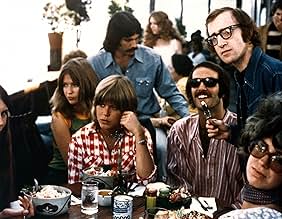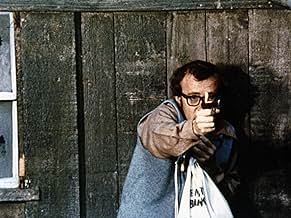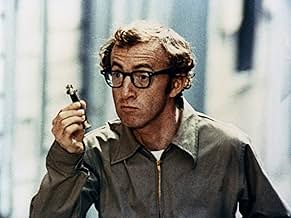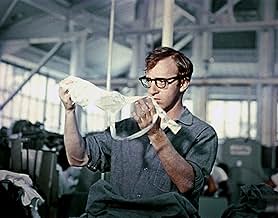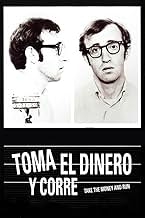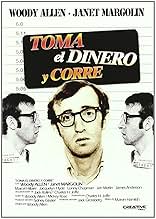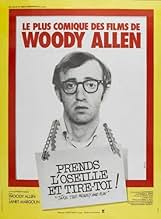CALIFICACIÓN DE IMDb
7.2/10
32 k
TU CALIFICACIÓN
La vida y desventuras de Virgil Starkwell, inepto ladrón de bancos.La vida y desventuras de Virgil Starkwell, inepto ladrón de bancos.La vida y desventuras de Virgil Starkwell, inepto ladrón de bancos.
- Premios
- 3 nominaciones en total
Dan Frazer
- Julius Epstein - The Psychiatrist
- (as Don Frazier)
- Dirección
- Guionistas
- Todo el elenco y el equipo
- Producción, taquilla y más en IMDbPro
Opiniones destacadas
Take the Money and Run (1969) was Woody Allen's motion picture debut (sans 'Tiger Lily). The film follows the life of a criminal loser, shot in a faux documentary style. Allen used the most out of his small budget and made an amusing film. This was the beginning of his slapstick/farce phase that would last until the early 70's. An interesting start for one of America's most unique film-makers of that era. The script by Mickey Rose and Woody Allen is deeply engraved with screwball humor from their childhood icons such as the Marx Brothers and Charles Chaplin. This film showed the promise of a brilliant director who would become a major player in Hollywood in the years to come. Highly recommended.
A.
A.
Virgil Starkwell was a product of his environment. Born into a poor family living in a rough community, Virgil soon finds companionship with a rough crowd and gets sucked into a life of petty crime from a very young age. An interest in the cello is not enough to set him straight and his acts continue into adulthood. Love, a powerful motivator, proves to be his undoing as he tries to rob a bank to fund his relationship.
We all talk about Allen's "earlier, funnier" films (even he does) but this probably doesn't extend the whole way to the very start of his film career because this, his second film, isn't up to the standard of Love & Death, Annie Hall and the like. The film is a mockumentary looking at the life and career of failing small-time criminal Virgil Starkwell and as such there is a basic narrative to provide some structure. Supposedly tightened up significantly in the editing room, the film is still pretty baggy at times and doesn't really have the material to carry it to even 85 minutes. However what the film does do well is produce plenty of imaginative moments that made me laugh out of nothing. I think of the scene where Virgil hires a car to run his blackmailer down, the spelling errors on the notes and others that are imaginative twists on what you expect and funnier for it. The one liners (and dialogue generally) is not as strong as Allen fans would hope for because the humour tends towards the sight gag.
This isn't a criticism because the sight gags are mostly good but the problem is one of consistency. I wasn't laughing anywhere enough for this to be a memorable comedy and there were quite a few lulls. These came particularly where the film had a section of narrative or dialogue rather than fast visual snippets under the narrator it is the latter that are the strongest parts of the film but they can't come quick enough and there isn't enough to support it in-between. Allen makes a good lead of course and I found him to be very good at delivering the visual comedy. Margolin is a bit too stiff; not good enough at the comedy or the dramatic stuff. The rest of the support cast does what they are required to do but the film does belong to Allen and his script. Credit should go to editor Rosenblum for making it as tight as possible and keeping the visual gags flowing as best as he can while limiting the weaker dialogue bits.
Overall then an amusing film that will appeal mostly to Woody Allen films. There are plenty of imaginative comedy moments but it is not as consistent as it needed to be to consider it on the same level as Allen's finest films (that would follow this in the 1970's in my opinion).
We all talk about Allen's "earlier, funnier" films (even he does) but this probably doesn't extend the whole way to the very start of his film career because this, his second film, isn't up to the standard of Love & Death, Annie Hall and the like. The film is a mockumentary looking at the life and career of failing small-time criminal Virgil Starkwell and as such there is a basic narrative to provide some structure. Supposedly tightened up significantly in the editing room, the film is still pretty baggy at times and doesn't really have the material to carry it to even 85 minutes. However what the film does do well is produce plenty of imaginative moments that made me laugh out of nothing. I think of the scene where Virgil hires a car to run his blackmailer down, the spelling errors on the notes and others that are imaginative twists on what you expect and funnier for it. The one liners (and dialogue generally) is not as strong as Allen fans would hope for because the humour tends towards the sight gag.
This isn't a criticism because the sight gags are mostly good but the problem is one of consistency. I wasn't laughing anywhere enough for this to be a memorable comedy and there were quite a few lulls. These came particularly where the film had a section of narrative or dialogue rather than fast visual snippets under the narrator it is the latter that are the strongest parts of the film but they can't come quick enough and there isn't enough to support it in-between. Allen makes a good lead of course and I found him to be very good at delivering the visual comedy. Margolin is a bit too stiff; not good enough at the comedy or the dramatic stuff. The rest of the support cast does what they are required to do but the film does belong to Allen and his script. Credit should go to editor Rosenblum for making it as tight as possible and keeping the visual gags flowing as best as he can while limiting the weaker dialogue bits.
Overall then an amusing film that will appeal mostly to Woody Allen films. There are plenty of imaginative comedy moments but it is not as consistent as it needed to be to consider it on the same level as Allen's finest films (that would follow this in the 1970's in my opinion).
The clumsy Virgil Starkwell (Woody Allen) is bullied when he is a child. Then he decides to play cello, but without musical talent, the loser joins a street gang and ends in prison. When he escapes, he meets the laundry worker Louise (Janet Margolin) and lies to her, telling that he plays cello in the symphonic orchestra.
He is arrested in a hold up and Louise finds him in prison. He breaks out and flees with Louise to another state. He tries to be honest but he is incapable to fit in any job. When he finally finds a job position suitable for his intellect, he is blackmailed by a colleague and returns to his criminal life. But his heists are disastrous and he always ends in prison.
"Take the Money and Run" is the second film by Woody Allen in a documentary style the same way he does with "Zelig" in 1983, and tells the saga of a clumsy smalltime thief. The last time I had seen this film was on 22 August 1999 and this time I found it still enjoyable, but less than the last time.
Virgil Starkwell is an incompetent loser obsessed with bank heists. The narrative and interviews in the documentary style of the 60's and 70's have hilarious moments and is closed by the funny interview of his neighbor that asks to the interviewer how an imbecile like Virgil could plan the heist of banks. My vote is seven.
Title (Brazil): "Um Assaltante Bem Trapalhão" ("A Very Clumsy Thief")
He is arrested in a hold up and Louise finds him in prison. He breaks out and flees with Louise to another state. He tries to be honest but he is incapable to fit in any job. When he finally finds a job position suitable for his intellect, he is blackmailed by a colleague and returns to his criminal life. But his heists are disastrous and he always ends in prison.
"Take the Money and Run" is the second film by Woody Allen in a documentary style the same way he does with "Zelig" in 1983, and tells the saga of a clumsy smalltime thief. The last time I had seen this film was on 22 August 1999 and this time I found it still enjoyable, but less than the last time.
Virgil Starkwell is an incompetent loser obsessed with bank heists. The narrative and interviews in the documentary style of the 60's and 70's have hilarious moments and is closed by the funny interview of his neighbor that asks to the interviewer how an imbecile like Virgil could plan the heist of banks. My vote is seven.
Title (Brazil): "Um Assaltante Bem Trapalhão" ("A Very Clumsy Thief")
Woody Allen hit gold with his second film, "Take the Money and Run", which is a basic film that works on so many levels and is memorable strictly for its charm and good wit.
The story follows Allen's Virgil Starkwell, whose life is told in documentary fashion. We learn he had a strange childhood and turned to crime to fulfill his needs. We learn of his romance and sympathize with him as we engage in prison escapes and witness him put in a chain gang. The documentary style might prove to be a "gimmick" of sorts, but it works because had the story been told any other way it simply would not have worked.
Also, "Take the Money" is an early token of what's to come and what the general audience will expect of Allen; smooth drama balanced by fast, witty monologues and lots of self-humiliation. To see this is to witness the early work of the director who ultimately brought us "Bananas", "Sleeper", "Manhattan", and the Oscar-winning "Annie Hall". And if anything, just track it for its over-the-top humor, not as in-your-face funny as "Sleeper" or as sexually hilarious as "Annie Hall", but it's warm and withdrawn, balanced all together by a very good ending (always one of the weaker parts in almost all of Allen's films).
Highly recommended! ***+ (8.5/10)
The story follows Allen's Virgil Starkwell, whose life is told in documentary fashion. We learn he had a strange childhood and turned to crime to fulfill his needs. We learn of his romance and sympathize with him as we engage in prison escapes and witness him put in a chain gang. The documentary style might prove to be a "gimmick" of sorts, but it works because had the story been told any other way it simply would not have worked.
Also, "Take the Money" is an early token of what's to come and what the general audience will expect of Allen; smooth drama balanced by fast, witty monologues and lots of self-humiliation. To see this is to witness the early work of the director who ultimately brought us "Bananas", "Sleeper", "Manhattan", and the Oscar-winning "Annie Hall". And if anything, just track it for its over-the-top humor, not as in-your-face funny as "Sleeper" or as sexually hilarious as "Annie Hall", but it's warm and withdrawn, balanced all together by a very good ending (always one of the weaker parts in almost all of Allen's films).
Highly recommended! ***+ (8.5/10)
Very early Woody Allen winner has the all-time lovable loser trying to make ends meet with girlfriend and future wife Janet Margolin. Allen, obviously pretty unskilled in most everything, decides that he can do just what the title of the film says and achieve true happiness with his one true love. Documentary-styled footage makes the picture unfold in a quietly uproarious way as Allen uses corny techniques used by most news organizations to tell a story that would have looked very odd without his insight being involved. Allen's films only work because he makes them work usually and that is definitely the case with "Take the Money and Run". Once again he shows unlimited potential and would use this movie, more than any other, as a spring-board for much future success in the 1970s, 1980s and beyond. 4 stars out of 5.
¿Sabías que…?
- TriviaThe first widely-released "mockumentary."
- ErroresAs the chain gang escapes, they climb the same embankment twice.
- ConexionesFeatured in The Dick Cavett Show: Woody Allen (1971)
Selecciones populares
Inicia sesión para calificar y agrega a la lista de videos para obtener recomendaciones personalizadas
- How long is Take the Money and Run?Con tecnología de Alexa
Detalles
- Fecha de lanzamiento
- País de origen
- Idiomas
- También se conoce como
- Robó... huyó... ¡y lo pescaron!
- Locaciones de filmación
- Productoras
- Ver más créditos de la compañía en IMDbPro
Taquilla
- Presupuesto
- USD 1,500,000 (estimado)
- Tiempo de ejecución1 hora 25 minutos
- Mezcla de sonido
- Relación de aspecto
- 1.85 : 1
Contribuir a esta página
Sugiere una edición o agrega el contenido que falta

Principales brechas de datos
By what name was Robó, huyó y lo pescaron (1969) officially released in India in English?
Responda


